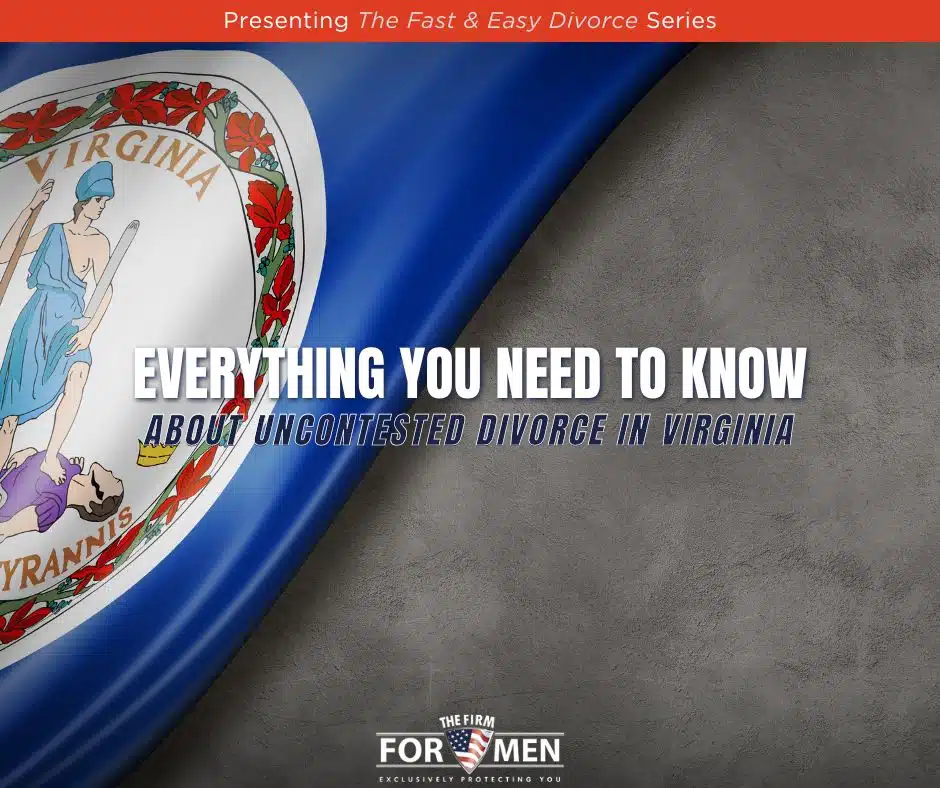If you remember nothing else about Virginia law, remember this: uncontested is not the same as pleading no contest. If you find yourself having to plead no contest, you are amid criminal proceedings, and you are on the losing side. If you and your departing spouse pursue an uncontested divorce, you both may end up on the winning side.
Jump to a Section
Divorce in Virginia
Divorce in Virginia comes in two sets of two different types:
- No-fault divorce — Under Code of Virginia § 20-91(9)(a), either party in a marriage can separate from the other for a period of either six months (with no children from the marriage) or for a year (with children from the marriage) without accusing the other of anything
- Fault grounds divorce — One spouse legally accuses the other of one of the conditions outlined in Code of Virginia § 20-91, (A)(1), (A)(3), and (A)(6), all of which are somewhat heinous, reputation-destroying things (like adultery, cruelty, and felonies)
Contesting something legally means you do not agree with the opposing party and need a Virginia judge to determine the right answer. While either type of divorce — no-fault or fault grounds — can be contested or uncontested, you seldom see an uncontested, fault grounds divorce. For a spouse to agree to a fault-grounds divorce without objection, that spouse must admit to potentially illegal, definitely disreputable behavior.
Similarly, you seldom hear of a contested, no-fault divorce. The two approaches more clearly defined are:
- Contested divorce — You and your divorcing spouse cannot agree on five major aspects of divorce covered in a property settlement agreement: child custody, child support, parenting time schedules, property division, and spousal support
- Uncontested divorce — You and your spouse agree in principle on the five big challenge areas
Is DIY the Alternate Route?
Virginia’s court system tries to offer Virginians (remember, in an uncontested divorce in the Commonwealth, at least one of you must be a Virginia resident) a super-fast, super-cheap way to DIY uncontested divorce. Their website takes you to Virginia Legal Aid and its online forms program, but even Legal Aid cautions, “Court procedures in the Circuit Court are complicated — even in no-fault divorces — so most people hire attorneys to assist them.”
Truer words were never spoken.
While we respect the aims and ambitions of both the Virginia court system and Legal Aid, most Virginia men do not find uncontested divorce to be a truly do-it-yourself process.
Legal forms for Virginia divorce are necessarily complicated because the results are profoundly life-altering. Most men prefer an attorney to walk them safely through the process.
Playing by the Rules
No family law attorney practicing in Virginia can guarantee results to clients. Most lawyers will tell you, though, that an uncontested, no-fault divorce provides the least stressful, fastest path to divorcing your spouse and getting on with your life.
If an uncontested divorce was a board game, this is how you and your departing spouse would play:
- Five players are required: you, your spouse, your family law attorney, your spouse’s lawyer, and a Virginia Circuit Court judge
- Two of the players (you and your spouse) separate for either six months or a year
- During separation, four players (the judge sits out this round) work on agreements for the five challenges: child custody; child support; spousal support; property division; and parenting time schedules (some matters can be set aside for later discussion, but the more you iron out and write down, the faster the process)
- One of the players (an attorney) draws up a property settlement agreement for all the players to sign
- One of the players (an attorney again) files a divorce complaint with a Virginia Circuit Court, including the property settlement agreement so the fifth player — the judge — knows the divorce is uncontested
- The judge prepares a final divorce decree, gets everyone to sign it, reviews everything once more, and then declares two of the players (you and your spouse) the winners
The Express Route
So if the DIY route is not generally advisable, and the process itself is at least nine to 12 months, does an express route exist? Your family law attorney can provide some pro-level tips to expedite your divorce. One strategy: waiver of notice. Suppose you are the one filing for the divorce. Have your spouse sign a waiver of notice to avoid having the papers served.
Talk with your lawyer about any other ways to keep the whole separation-and-divorce process moving along. In some cases, you can avoid the final court hearing by filing an affidavit.
Is this everything you need to know about uncontested divorce? Perhaps not. You may still have questions. Contact us today at The Firm For Men, or call our office at (757) 383-9184. We know uncontested divorce forwards and backwards, inside, and out. We help Virginia’s men through all family law procedures, from separation to divorce and more.

